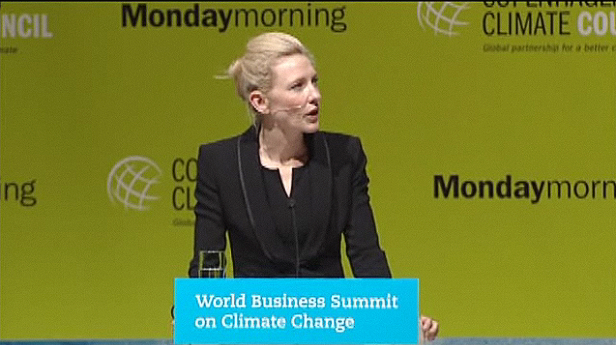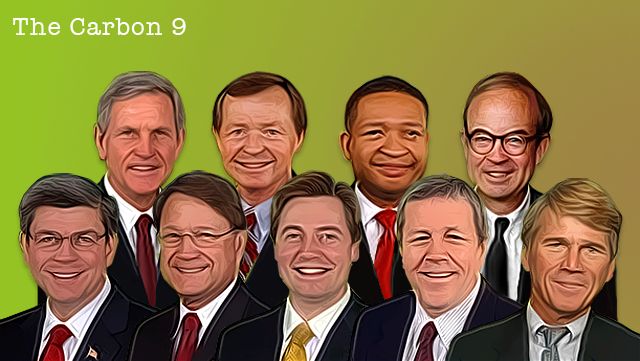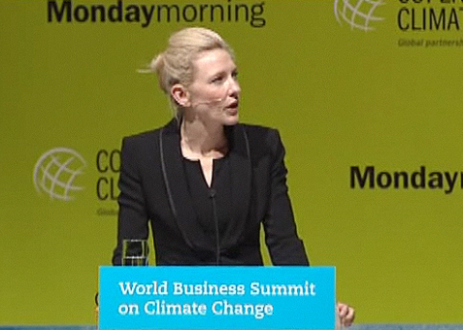 Actress Cate Blanchett tried to warm business leaders’ hearts on the subject of global climate change.Copenhagen Climate Council
Actress Cate Blanchett tried to warm business leaders’ hearts on the subject of global climate change.Copenhagen Climate Council
If Al Gore and Ban Ki-moon weren’t able to get the job done, you might have thought Cate Blanchett would saved the day. But even an impassioned and remarkably erudite speech by the Oscar-winning actress failed this week to persuade world business leaders to go beyond mere rhetoric in pushing for action on climate change.
The scene was Copenhagen, the site of this December’s vital negotiations on a new deal to combat global warming before it runs out of control. The event was the grandly titled World Business Summit on Climate Change, one of a series of meetings held in the city during the course of this year designed to press governments to take the radical measures that will be needed.
At a March gathering in the Danish capital, a meeting of the International Scientific Congress did just that, making it clear that the rate and effects of climate change are already fulfilling — and sometimes exceeding — their worst-case scenarios. And there was reason to hope that the business summit this past weekend, which brought together more than 500 CEOs from around the world, would turn up the pressure.
After all, many business leaders have already been at the forefront of attempts to get governments to take action. The U.S. Climate Action Partnership — comprised of blue-chip companies like General Electric, Dupont and Alcoa — was long a thorn in the recalcitrant flesh of the Bush administration, and is now calling for cuts in U.S. emissions of 42 percent of 2005 levels by 2030 and 80 percent by 2050.
Across the Atlantic, the EU Corporate Leaders Group on Climate Change — made up of the heads of such household names as Shell, Vodaphone and Philips and convened by Prince Charles — was instrumental in persuading both the then British Prime Minister, Tony Blair, and EU President Manuel Barroso to make climate change a top priority. And more and more businesses on both sides of the pond are seeing and beginning to grasp the commercial opportunities in the technologies that will be needed in a low-carbon world.
With so much momentum seemingly at hand, Oxfam, which now devotes much effort to combatting climate change, talked up the business gathering in advance, saying the participants were “set to push wavering governments for more leadership and ambition at the eleventh hour.”
UN Secretary-General Ban Ki-moon duly told the delegates:
“As business leaders, you are crucially placed to ensure that government negotiators seal a deal. You have the ingenuity and vision to lead by example where others — including governments are lagging behind.
“A strong message from the business community to governments worldwide may make all the difference. You must make it clear to your leaders that doing the right thing for the climate is also the smart thing for global competitiveness and long-term prosperity. We may never get a better opportunity. And, if the world’s scientists are right, we may not get a second chance.”
Al Gore hammered home the urgency of immediate action. “We have to do it this year. Not next year, this year. The clock is ticking, because Mother Nature does not do bailouts.”
Then, to deliver the coup de grace, there was Cate Blanchett, who was spurred into environmental activism by the growing water crisis in her own country. She has installed solar panels to power her Sydney home and aims to run the Sydney Theatre company, where she is co-artistic director, on renewables. And she says she now limits her showers to four minutes “because I live in a desert called Australia.”
After quoting authorities from Garrett Hardin to John Gray, from J.R.R. Tolkein to Nicholas Stern, she concluded: “Political failure in Copenhagen is quite simply unacceptable and this powerful room must play a major role in preventing this failure. Your strong leadership through a compelling call to action at Copenhagen that delivers certainty to avoid the climate crisis is now needed.”
All to no avail. The business leaders did produce a “Copenhagen Call,” as they named it. Their rhetoric was fine: they called on “our political leaders to agree and ambitious and effective treaty” which “would help establish a firm foundation for a sustainable economic future.”
But they whimped out when it came to setting out what it should contain. They spoke of emission targets but failed specifically to recommend any, merely mentioning that limiting global temperature increases to two degrees “would entail abatement of around 17 GT (of carbon emissions) versus business-as-usual by 2020)” and referring in passing to the Intergovernmental Panel on Climate Change’s outdated suggestion that global levels should be cut in half by 2050. They mentioned the need for funds to help developing countries adapt to climate change, but ducked out of suggesting a figure.
Oxfam officials were left flabbergasted by how the conference had managed to ignore the strong messages from the speakers who had addressed it, and called the business leaders’ call “a tiny step in pushing for the right political recipe when it could have been a giant stride.”
The group added, all too correctly, that the much-vaunted summit had “articulated the scale of the problem, but not the specifics of the solution.”
Editor’s note: The story was updated on May 28 to note that the business leaders’ climate statement suggested a figure for how much global carbon emissions should be cut to avoid significant increases in global temperatures.
—
Below, watch videos from the World Business Summit on Climate Change:




